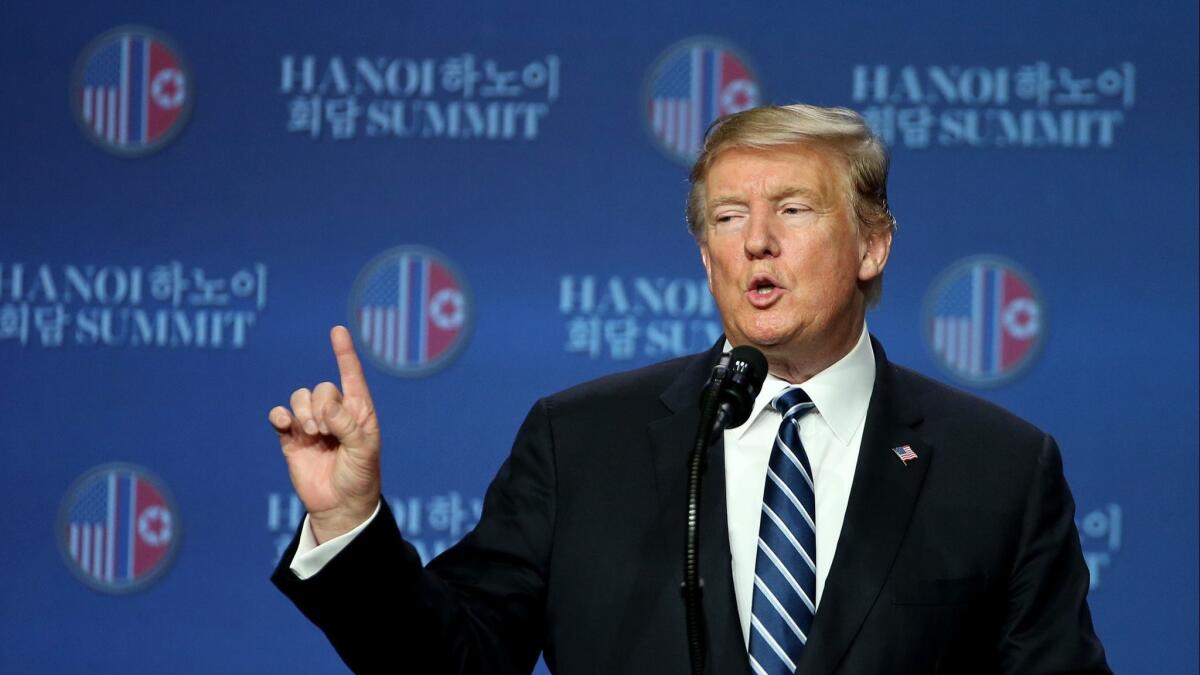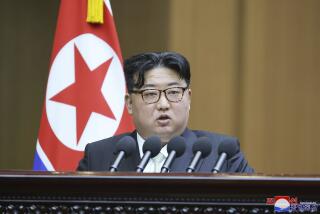Op-Ed: It’s not too late for Trump to salvage a deal with North Korea

If one were prone to betting, the smart play would be to wager on the U.S.-North Korea denuclearization talks falling apart. This would be unfortunate, but hardly a surprise given the Trump administration’s pursuit of the same failed paradigm that has defined U.S. nuclear diplomacy over the last quarter of a century.
The Trump administration remains confident that economic pain and North Korea leader Kim Jong Un’s desire for economic prosperity will eventually compel North Korea to give away a nuclear weapons program it has spent considerable resources building and refining over decades. Kim is becoming increasingly impatient with Washington’s approach and is expressing his frustration through rhetoric in state media and recently with the first ballistic missile tests in 18 months.
Nearly a year after President Trump and Kim first met in Singapore, diplomacy is at an impasse. If Trump wants to make history managing a problem that has frustrated previous presidents, he must shift the paradigm and change how the U.S. views the North Korean nuclear issue.
It is obvious the current approach will not work. The president is courting failure by focusing almost exclusively on immediate denuclearization up front and at the expense of everything else — including a historic opportunity to establish a comprehensive and durable peace regime on the Korean Peninsula.
If Trump wants to make more progress on the North Korea file than his predecessors, he must stop fixating on an outcome that is not in the cards.
While the North Koreans have been willing to talk to the United States about their prized nuclear program, Kim has demonstrated no appetite for fully relinquishing it. He would be foolish to disarm, especially unilaterally. Kim may be open to continuing his moratorium on nuclear and intercontinental ballistic missile tests, but it’s virtually inconceivable he would agree to eliminate his entire program in return for the promise of future sanctions relief. This same arrangement has been on the table for decades.
The reticence is quite reasonable from what is surely Kim’s perspective. North Korea, a country with no true allies, is an economic and political shrimp amongst whales in an extremely competitive neighborhood. Nuclear weapons are a life insurance policy for poverty-stricken North Korea, which has a seven-decade adversarial relationship with what has become the world’s only superpower. There is no security assurance Washington can provide that would be enticing enough for Kim to eliminate the security a nuclear weapons program represents.
Fortunately, a nonnuclear North Korea is not a prerequisite for U.S. security. Washington can protect and defend the American people if Pyongyang continues to possess nuclear arms. Kim may be a brutal dictator, but he is probably not suicidal. As long as he is not provoked unnecessarily, the North Korean leader probably will not use his nuclear weapons against any nation, let alone an exponentially more powerful country like the United States. Kim understands that his regime would be over the moment he ordered a launch. Deterrence keeps the United States safe from Russia and China — and North Korea.
If Trump wants to make more progress on the North Korea file than his predecessors, he must stop fixating on an outcome that is not in the cards. He must replace immediate denuclearization with a full-bore effort toward easing tensions and normalizing the U.S.-North Korea relationship.
Trump should clearly communicate to Kim that he is interested in a third summit with a more realistic agenda. Rather than pushing on a closed door and stressing an all-for-all nuclear deal Kim won’t accept, Trump should channel his energy on working toward a more productive relationship.
The president should propose establishing liaison offices to regularize communication between Washington and Pyongyang. This would be a win-win proposition that costs Washington nothing. The more communication there is, the more understanding there will be — an essential ingredient in preventing miscalculations from degenerating into conflicts.
Trump should cease listening to failed advice from the Washington foreign policy establishment on what sanctions can achieve. The administration’s “maximum pressure” campaign has produced minimal results. The Kim regime has shown itself to be a master at sanctions evasion and impervious to surrender. This is especially so when the terms of surrender include the total elimination of the regime’s security blanket.
Enter the Fray: First takes on the news of the minute from L.A. Times Opinion »
Rather than doubling down on sanctions and hoping for a different result, Trump should boldly change course and support South Korean President Moon Jae-in’s efforts to build a more constructive North-South relationship. This means carving out exemptions to the current sanctions architecture and allowing Moon to proceed with the various inter-Korean reconciliation agreements signed last year — agreements that were founded on economic normalization and military deescalation. A more peaceful Korean Peninsula is beneficial to U.S. national security interests and vital to Korean interests.
Just as important, Trump should reorient the entire discussion about North Korea in Washington. U.S. foreign policy leaders should realize denuclearization is a long-term prospect — if that’s possible. Deterrence and shrewd diplomacy, however, have the potential to produce wonderful and important gains in the meantime.
At this stage in North Korea diplomacy, the United States has a choice. It can continue pushing for an unrealistic outcome. Or it can buck the orthodoxy that has dominated Washington for so long and negotiate for results that are actually on the table. Being prudent could open up a road to a brighter future for the Korean people and a safer one for the United States.
Daniel R. DePetris is a fellow at Defense Priorities.
More to Read
A cure for the common opinion
Get thought-provoking perspectives with our weekly newsletter.
You may occasionally receive promotional content from the Los Angeles Times.





